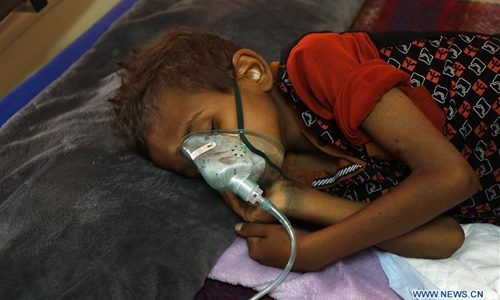HOME >> SCI-TECH
Scientists complete most comprehensive analysis of whole cancer genomes
Source:Xinhua Published: 2020/2/6 11:15:48

A boy cancer patient lies in a bed as he receives medical treatment at a cancer treating center in Sanaa, Yemen, on Feb. 4, 2020, the World Cancer Day. A WHO report in February 2019 estimated that number of cancer patients in Yemen reaches approximately 35,000. (Photo by Mohammed Mohammed/Xinhua)
By completing the most comprehensive study of whole cancer genomes to date, an international team of scientists has garnered deeper understanding of cancer, paving the way for more effective treatment, the Wellcome Sanger Institute said on Wednesday.
The ICGC/TCGA Pan-Cancer Analysis of Whole Genomes Project (PCAWG), or the Pan-Cancer Project, is a collaboration involving more than 1,300 scientists and clinicians from 37 countries. Researchers from the Wellcome Sanger Institute in the UK are part of the team.
They analysed more than 2,600 genomes of 38 different tumour types, creating a huge resource of primary cancer genomes. This was then the launch-point for 16 working groups studying multiple aspects of cancer's development, causation, progression and classification.
In a series of papers published Wednesday in the journal Nature and its affiliated journals, the Pan-Cancer Project discovers causes of previously unexplained cancers, pinpoints cancer-causing events and zeroes in on mechanisms of development.
"The genome of each patient's cancer is unique, but there are a finite set of recurring patterns, so with large enough studies we can identify all these patterns to optimize diagnosis and treatment," said Dr. Peter Campbell, member of the Pan-Cancer Project steering committee and head of Cancer, Ageing and Somatic Mutation at the Wellcome Sanger Institute.
Tumour types can be identified accurately according to the patterns of genetic changes seen throughout the genome, potentially aiding the diagnosis of a patient's cancer where conventional clinical tests could not identify its type, and knowledge of the exact tumour type could also help tailor treatments, according to the Wellcome Sanger Institute.
Posted in: BIOLOGY